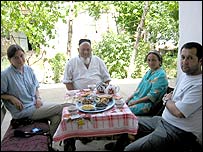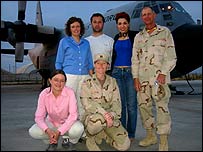|
By Monica Whitlock
BBC News, London
|

BBC accounts of an uprising in the Uzbek town of Andijan earlier this year - when government troops opened fire on protesters - have resulted in the closure of the BBC bureau in the capital, Tashkent.
There is a recording we made from Andijan so chilling that people cannot speak while it is playing.

The BBC team was the first to set up office in Uzbekistan
|
It is an open line to the mobile phone of one of the demonstrators. You can hear a wall of automatic gunfire, like siege fire, and among it people muttering their last prayers: "Allah-u Akbar, Allah-u Akbar - God is great." As the shooting grows louder and louder, the voices become thinner until, after more than an hour there is a click, and silence.
The man with the phone was killed.
This recording and many, many others from Andijan are the reason why we have been forced to leave Uzbekistan.
Andijan carnage
There were TV films in which ordinary men and women spoke out about their children being tortured in jail, strung upside down, frozen in iced water.
 |
 He was shot more than 20 times... we counted the holes He was shot more than 20 times... we counted the holes 
|
There was the weeping 15-year-old who told us how troops had ambushed him and his mother as they tried to run away from the shooting across the border into Kyrgyzstan.
There was the mother who risked her life to show us the clothes of her dead son, a young baker who had simply gone to watch the demonstration and never come home.
He was shot more than 20 times. We counted the holes.
There was the gravedigger who told us how he and all the gravediggers in Andijan had been forced to the hills outside the city to make nameless pits for the uncountable corpses wrapped in plastic and buried in secret.
Each one of these stories flew in the face of the government version: that what happened at Andijan was an attempted coup by Islamic terrorists.
Eviction notice
The government denounced the BBC and blocked it. But they could not stop it.
Someone, night after night, pushed printed pages from the BBC News website under peoples' doors in Andijan.
With a soft, warning knock they disappeared.
In Tashkent, people who never thought twice about politics sat huddled around radios in the evening, craning to hear every story on the BBC.

The BBC team were the only ones to visit the US airbase in Khanabad
|
Word spread, from street to street. And anger grew. Anger, first about the killings, then anger about the scale of what many saw as a huge, official lie.
So I should not have been surprised when the foreign ministry summoned me and read out a prepared statement, accusing me of complicity with terrorists.
They made it clear that I had to leave, quickly.
A day later, I was gone and the unravelling of the bureau had begun.
So I should not have been surprised.
But I was.
Raw reporting
We had been in Uzbekistan for so long - the only international broadcaster to set up there in the early 1990s when the Soviet Union collapsed and Uzbekistan became a country.
In those days, we worked from a little house on Ulitsa Ivleva (Ivleva Street), famous among the tiny band of journalists and others who were drawn to Central Asia.

'We were all like family members'
|
There were always guests, a lunch for anyone who dropped in, sometimes even people camping in the garden.
Communications were so poor that the whole office sometimes took it in turns for hours raising a dialling tone on the phone.
Long, hot nights were lost trying to send a fax, waiting anxiously for acknowledgement that it got through.
And all because in this fascinating, unknown land every story was fresh and new. No press releases, no press pack, just amazing, solitary journeys up mountains and through deserts to report real news.
Home sweet home
As time wore on, the office expanded.
We reported in Uzbek, in Russian, in Persian, Kazakh and Kyrgyz, as well as English.
We moved to a bigger place with phones that worked nearly all the time except, of course, when it snowed.

The Americans have been ordered out of Uzbekistan
|
But our spirit remained.
Lunch stayed central to the workings of BBC Tashkent. Around our now huge kitchen table sat 10, 15 people or more, chatting in an assortment of languages.
Who were they all?
We were not always sure. Someone's cousin, someone's child, an Afghan poet, a musician who had been banned.
From time to time, one would leap up and chase out the swallows who tried, with success, to nest in the office year after year.
Visitors from the wider BBC were surprised by the Tashkent office.
They were not sure what to make of the place but they always succumbed to its grace and gentleness - our drivers who would bargain them down not up, the intense sunshine, the friendliness, the kindness.
Temporary measures
It is all over now.
Next spring the swallows will build their nests in peace.
Our staff have scattered all over the world.
Ordinary people who have been with the bureau from the first days have rolled up their lives into suitcases bulging with knives and forks, quilts and pans.
They are starting their lives all over again.
But reporting is not just about bureaux. It is about telling the stories that need to be told, whatever it takes to do that.
We will continue to report on Uzbekistan and - as soon as we can - we will be back in the country.
Governments, after all, do not last forever. Even those so frightened of the truth that they get rid of anyone who speaks it.
